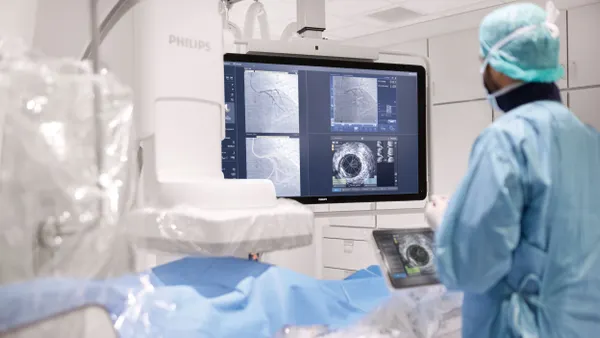Dive Brief:
- Boston Scientific announced Thursday the launch of two new deep brain stimulation (DBS) system products for the treatment of Parkinson's disease.
- The company indicated that the systems incorporate smaller devices and offer longer battery life and better customizable stimulation compared to other market offerings, leading to better patient comfort and easier adaptability by physicians as a patient's needs change throughout treatment.
- The rechargable Vercise Gevia and non-rechargable Vercise Primary Cell DBS systems both recently received premarket approval from FDA, building on the December 2017 approval of the first Boston Scientific Vercise System.
Dive Insight:
Parkinson's disease is a neurodegenerative disorder that primarily causes symptoms like tremors, stiffness, slowness and difficulties with swallowing, speaking and balance, due to progressive death of brain cells leading to decreased dopamine production in the brain.
DBS treatment isn't new — it's been used to manage the progression of Parkinson's for more than 25 years. The therapy, as described by Boston Scientific, involves mild electrical stimulation being sent to leads implanted in a targeted area of the brain, powered by an implantable pulse generator.
The company said the newly-available systems "leverage eight individually controlled electrodes on each lead to offer stimulation that can adapt to impedance changes within the brain," offering more precise stimulation to the neural target, helping to avoid unintended side effects.
The rechargable Gevia system is meant to have a battery life of at least 15 years and the non-rechargeable Primary Cell system, which Boston Scientific says offers the same stimulation capability, has a likely battery life of at least three years. Both systems connect to software that allows a physician to visualize how the stimulation will be distributed.
A recent preliminary earnings release from Boston Scientific indicated that its neuromodulation division, under its MedSurg unit, did $780 million in sales in 2018, a more than 22% increase over 2017. While some naysayers think negative patient perceptions of electrical stimulation treatments could hold the market back, in Boston Scientific's recent presentation at the J.P. Morgan Healthcare Conference, executives reported neuromodulation could offer a $1 billion opportunity for the company by 2022. Boston Scientific is looking to expand its indications for DBS by 2023, also per the JPM presentation.
Competitors include Abbott, which boosted its market position with a pick-up of St. Jude Medical and its Infinity DBS system in 2017, and Medtronic, which indicated in its JPM presentation that it intends to expand the DBS offerings within its restorative therapies group, indicating the potential launch of a cranial mounted DBS system sometime after 2020.
Boston Scientific said that the Vercise Directional DBS systems are currently being used in a global DBS postmarket registry and other clinical studies. Also this week, the company touted results from two studies on other devices, one that tested effectiveness of its stent system for iliac and femoral vein obstructions, and the other investigating outcomes associated with the company's water vapor therapy for treatment of benign prostatic hyperplasia.
Boston Scientific will host its fourth quarter 2018 earnings call Feb. 6.












